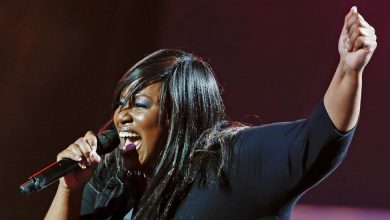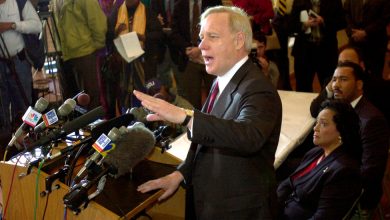In Virginia, Early Voting Has an Impact. And a Long Run.

In the tight race for governor of Virginia, Election Day has morphed into Election Month.
By the time voters cast their ballots on Election Day next Tuesday, hundreds of thousands of other voters will have already done so in person and by mail during a month and a half of early voting. The state’s six-week early voting period, one of the longest in the country, began on Sept. 17 and ends on Saturday.
More than 788,000 ballots had been cast in person and by mail as of Tuesday, more than four times the early turnout four years ago, according to the Virginia Public Access Project, a nonpartisan group that tracks voting data.
The surge in early voting signals that the sea change in voting habits in 2020 may forever alter elections around the country.
The coronavirus pandemic has helped convert more and more voters into early voters — in the 2020 presidential election, the early vote made up 63 percent of the electorate, up from 36 percent in 2016. Even as conservatives have attacked the legitimacy of voting by mail with false claims of widespread fraud, the popularity of early voting in Virginia by both Democrats and Republicans has been shaping the dynamics of the race and may play a role in delaying the final results if the election is extraordinarily close.
Before 2020 in Virginia, early voting lasted for seven days and required an excuse from voters. Last year, the State Legislature extended early voting to up to 45 days and expanded access to all voters by removing the excuse requirement, a response, in part, to the pandemic.
“We used to shove four million voters through the doors in 13 hours,” said Christopher E. Piper, the commissioner of the Virginia Department of Elections. “Now we can do that over the course of 45 days.”
The shift in voting habits creates a host of new electoral difficulties.
With more voters casting ballots by mail, postal system delays are threatening to disenfranchise thousands of voters. With hundreds of thousands of votes cast, but no party registration data in Virginia, both candidates are pushing internal campaign projections to claim momentum.
And if the race is extremely close, final results might not be known for days, akin to the 2020 presidential election.
Virginia requires that counties begin processing ballots this week by opening the envelopes, checking for eligibility and scanning them. But the state also accepts ballots that were postmarked by Election Day but not received by officials until the following Friday (18 other states and the District of Columbia have similar provisions). In 2020, 10,901 ballots were received and counted after Election Day in Virginia.
If the race between Terry McAuliffe, the Democratic candidate, and Glenn Youngkin, the Republican candidate, is extremely close, those late-arriving ballots, coupled with an expected increase in provisional ballots, could be pivotal. A winner may not be projected for up to a week.
“I think that’s the future of everybody’s elections the more we go to voting by mail as an option for voters,” said Scott O. Konopasek, the director of elections for Fairfax County, the largest county in Virginia. “If there’s any close races, we’re not going to know until after the Friday after the election.”
While the surge in early voting has exceeded the early turnout in 2016, the numbers this year have failed to keep up with 2020, in part because the Virginia election is an off-year race. Still, based on current early voting trends, overall turnout could top out around 2.6 million, roughly on par with the 2017 elections, according to Michael McDonald, a professor of politics at the University of Florida who studies voting.
So far, early vote totals in Virginia reflect more of a shift in behavior than a rise in turnout, as 90 percent of early voters in Virginia this year also voted early in the 2020 election, according to TargetSmart, a Democratic political data firm.
“Some people weren’t aware that they could vote by absentee ballot or vote early in 2020, because that was the first election that this law was changed, and now they just like doing it,” Mr. McDonald said.
Partisan models show Democrats continuing to outpace Republicans at a significant clip for early voting. But one of the voting blocs that has been a concern for the McAuliffe campaign has been the youth vote.
Voters between the ages of 18 and 29 made up less than 6 percent of the early vote according to TargetSmart. In past elections young voters were roughly 10 percent of the early vote. Currently, more than half of early voters have been over the age of 64, TargetSmart found. The only age bloc former President Donald J. Trump carried in the state during the 2020 election was those over 64.
Democrats have also had to contend with some election administration issues during the early vote. Last week, the Democratic Party of Virginia sued the Postal Service for what it claimed was an unusually slow processing of more than 25,000 mail ballots across three key counties: Albemarle, James City and Portsmouth.
The lawsuit asks a federal court to force the Postal Service to process all the remaining ballots in those counties in 24 hours.
But amid those challenges, the McAuliffe campaign has been claiming momentum, heightened by a significant uptick in voting last week in key Northern Virginia suburbs. Deeply blue Fairfax nearly tripled turnout after more voting locations were opened across the county.
“This year we expect to have the highest voter turnout ever seen in a nonpresidential year in Virginia,” said Christina Freundlich, a spokeswoman for the McAuliffe campaign. “We have seen a meaningful jump in the daily early vote totals from the past week, with over 250,000 ballots cast since last Monday, concentrated in high-density Democratic areas in Northern Virginia and Hampton Roads.”
The new laws that opened access to early voting, approved by a Democratic-controlled State Legislature and a Democratic governor in both 2020 and 2021, were criticized by some Republicans as attempting to write partisan advantage into the election code. Early voting by mail has been a constant target of Mr. Trump.
But Mr. Youngkin has aggressively embraced early voting and vote by mail, often holding rallies near early-voting sites, encouraging attendees to vote afterward. His campaign runs text messaging programs geared toward early voting, and door-to-door knockers help chase down mail ballots.
“Republicans don’t normally vote early, so we’re trying to set a new culture,” said Jeff Roe, a senior adviser to the Youngkin campaign who also advised the presidential campaigns of Mr. Trump in 2020 and Senator Ted Cruz in 2016.
Mr. Youngkin’s campaign says its focus on early voting is aiding his chances. While the data from both campaigns show Democrats with a lead in early-voting numbers, the Youngkin team claims it is outpacing Mr. Trump’s 2020 performance in Democratic counties, including Chesterfield and Henrico near Richmond and Virginia Beach in the east.
“We are on track to be in a good spot starting Election Day,” said Kristin Davison, a senior strategist for the Youngkin campaign.
Lisa Lerer contributed reporting.



